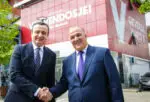According to RFE, students in Serbia have called for a boycott of Radio-Television Serbia (RTS), accusing the public broadcaster of biased reporting on their protests and university blockades. The call was issued on February 19 by students blocking the University of Arts in Belgrade, urging citizens to refrain from participating in RTS programming.
In their statement, the students argued that RTS not only relies on its employees but also on guests who contribute to its content. “By appearing on RTS, you assist their attempts to undermine and relativize the entire student and civic movement,” the statement read.

Demands for Objective Reporting
Students have repeatedly called on RTS to provide fair coverage of their protests and blockades. On two occasions, they organized demonstrations outside the RTS headquarters, where thousands demanded better representation of student actions on the public broadcaster.
On December 18, students from the Faculty of Dramatic Arts formally requested that RTS publish their rebuttal to a report misrepresenting their demands. The broadcaster failed to respond within the 30-day legal deadline, prompting further criticism from the students.
One student, Luka from the Faculty of Electrical Engineering, told Radio Free Europe that RTS has largely ignored students’ perspectives. “It took tens of thousands of people gathering outside RTS for us to get even a few extra minutes of coverage in the evening news. That is unacceptable,” he said.
Kristina, a journalism student at the Faculty of Political Sciences, criticized RTS’s reporting choices. She pointed out that on February 15, RTS devoted twice as much airtime to a ruling Serbian Progressive Party (SNS) rally in Sremska Mitrovica compared to a student protest in Kragujevac.

RTS Response and Expert Opinions
RTS has not officially responded to the boycott call. However, it did publish the students’ statement on its website without additional commentary.
Professor Rade Veljanovski from the Faculty of Political Sciences acknowledged that RTS has failed in its duty to provide objective reporting. However, he argued that boycotting the public broadcaster is counterproductive. “If you refuse to participate, you are cutting off one of the few remaining platforms where your voices could be heard,” he stated.
He suggested that RTS should launch daily segments dedicated to covering student protests, ensuring balanced reporting with contributions from different perspectives. “The public service should not act as a government mouthpiece but as a platform for open debate on key societal issues,” Veljanovski added.
RTS Coverage Analysis
A review of RTS broadcasts by the Bureau for Social Research found that while RTS has covered student protests daily in recent weeks, coverage has been minimal. Reports on student blockades typically appear around the tenth minute of the evening news, lasting no more than a minute. Meanwhile, government-related events, such as the SNS rally and the announcement of the “Declaration on Vojvodina,” have received significantly more airtime.
As student protests continue to gain momentum, the pressure on RTS to improve its reporting is expected to increase. Whether the boycott call will impact RTS’s editorial approach remains to be seen.







